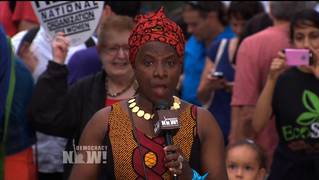
“Your people can’t take it anymore, Lord
In exchange for oil and gas they sell our country.”
These lines, translated from Portuguese, are from the song “Vendem o Pais,” “They Sell the Country,” by the late, great Mozambican hip hop artist Azagaia. Born Edson da Luz, he died on March 9th at the age of 38. He was a movement artist, empowering millions with songs challenging the elite and inspiring grassroots action. A frequent theme in his lyrics is the exploitation of Mozambique by extractive industries like oil and gas. Thousands poured into the streets on the news of his death, to honor his life and to protest the power structures he so consistently and eloquently criticized. The Mozambican government responded with a brutal crackdown, unleashing tear gas, rubber bullets, and beating and arresting protesters.
Azagaia’s death coincided with two events that reinforce central themes of his music. First, Cyclone Freddy, a world-record-breaking extreme storm, slammed Southern Africa not once but twice, wreaking devastation, killing over 500 people in Malawi, Mozambique, and Madagascar and displacing over one million people. And second, the United Nations Intergovernmental Panel on Climate Change, or IPCC, released its Sixth Synthesis Report, summarizing almost a decade of global scientific research on climate change and issuing its direst warnings yet on the urgency of immediate, concerted global climate action.
Cyclone Freddy was the longest-lived and highest-energy tropical cyclone in recorded history. The storm was named on February 6th, as it developed off the northwest coast of Australia. Freddy headed west over the Indian Ocean, building force from the historically high ocean surface temperatures, slamming into the island nation of Madagascar on February 21st. After then spending five days inundating Mozambique, Freddy retreated to the waters offshore, again building strength. As police were suppressing the Azagaia protests, Freddy arrived again, pummeling Mozambique and southern Malawi for four days before dissipating. The World Food Program and other aid agencies are scrambling to reach people cut off by the torrential rain, flooding and mudslides.
Cyclone Freddy serves as a stark illustration of the warnings included in the new IPCC report. “The rate of temperature rise in the last half-century is the highest in 2,000 years,” UN Secretary-General Antonio Guterres said as the report was released. “Concentrations of carbon dioxide are at their highest in at least 2 million years. The climate time bomb is ticking.” The science is unequivocal: humans are causing a climate catastrophe, and our window to avoid irreversible damage is closing rapidly. Most importantly, people in poor nations, in the Global South, bear the brunt of climate disasters, but have contributed the least to global carbon emissions. This is the ongoing legacy of colonialism and resource extraction embedded in the lyrics of Azagaia.
“So many people within our countries, especially in Africa, are invisible, evoking pity when a deadly cyclone hits, forgotten the week after,” Dipti Bhatnagar, climate justice activist based in Mozambique, wrote in a piece eulogizing Azagaia. “As the crises deepen, people are going to get more and more incensed,” she said on the Democracy Now! news hour. “The youth are going to get more and more incensed. We need cultural icons like Azagaia. We need space. We need constructive ways for people to get involved, to be able to organize, to oppose the injustices that are happening. And the powerful know that.”
A new front to challenge entrenched power is being opened in the United States. Founded by author and climate activist Bill McKibben, Third Act seeks to inspire people 60 years and older to take action against climate change.
“Third Act recognizes that young people have been providing the climate leadership, young people and people from frontline communities, Indigenous communities,” McKibben said on Democracy Now! “What they lack sometimes is the structural power to force change at the pace that we need. Older people have structural power…There are 70 million Americans over the age of 60. That is a sleeping giant.”
This week, Third Act launched a National Day of Action to Stop Dirty Banks. Protests were held in at least 30 states, at major banks like Chase, Citibank, Wells Fargo and Bank of America demanding they stop funding fossil fuel projects. “Here in D.C., for instance, the banks are going to be blockaded with people in rocking chairs,” McKibben explained. “Older people are sitting down today, but they’re also standing up in a way that they haven’t before.”
This latest IPCC report, Secretary General Guterres says, is “a how-to guide to defuse the climate time-bomb. It is a survival guide for humanity.” For a just and equitable transition away from fossil fuels, it will take grassroots organizing and action. As Azagaia often declared, “POVO NO PODER! (Put the People in Power!)”











Media Options